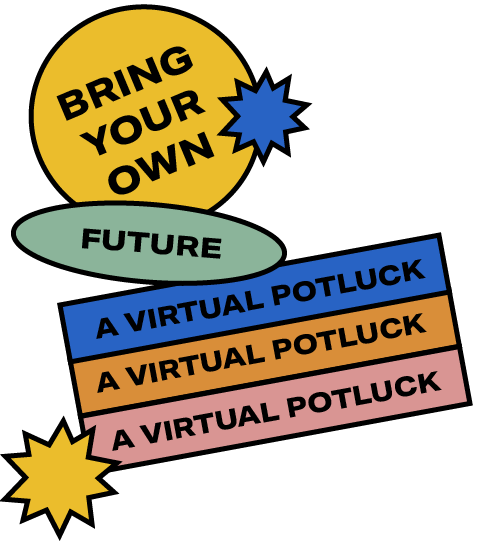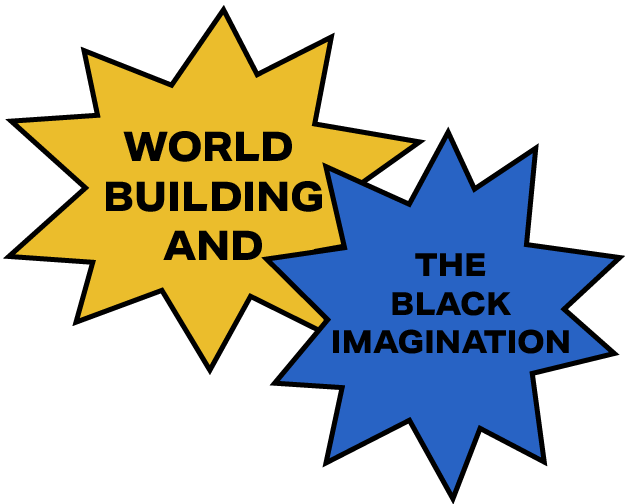

The Civic Media Fellows recognize that imagining is critical to build a better world and that social change is largely impossible without the ability to collectively conceptualize what the future can look like. Just as it is vital to organize to dismantle systems of oppression, it is necessary to be able to have a vision for what comes next. For this reason, many of the fellows create immersive experiences that allow people to enter into futuristic worlds or draw from the storyworlds of popular culture in order to engage peoples’ imagination and capability to dream. Some conduct workshops that allow participants to create objects from future worlds they would like to see, engaging in new forms of creation and collaboration. Drawing from traditions like black liberation and intersectional feminism, the fellows understand that building narratives and collective worldbuilding is essential to the process of working with communities for social change.
An immersive world centered around Black Liberation
Terry Marshall’s work with Intelligent Mischief, a creative design lab, draws from Afrofuturism and worldbuilding methods throughout a broad array of projects. Intelligent Mischief recently created a project called NationX, a fictional storyworld based on black liberation centered around a 700 year old maroon society trying to liberate people throughout the black diaspora. On January 15, 2021, they created a 24 hour, immersive online portal that featured rooms that allowed participants to experience different parts of this immersive story. Intelligent Mischief also created a project called Wakanda Dream Lab where they intervened in the fandom of Marvel’s Black Panther in order to mobilize the fandom around social justice issues. They created two anthologies where writers used the story world of Wakanda to talk about reimagining borders and gender justice through the storyworld of Wakanda. Whether working on cultural projects and immersive installations, or consulting with grassroots organizing groups, imagination is an inherent part of the group’s work. Terry reflected:
Our tagline is to unleash black imagination to shape the world. We believe imagination is a sustainable resource. It is the beginning and the spark for change. If people can envision it and imagine it, they can do it. If people can’t even imagine it, then you’re not going to be successful. We also believe in particular, that given the history and conditions of black folk throughout the diaspora, black imagination has particularly been a source of freedom dreaming. As black people have been enslaved or colonized, the freedom dreams of those black folks have been ones of liberatory content that is for all people. We see ourselves in that tradition when we use afrofuturism, imagination and worldbuilding as central to social change.
Building a Feminist Future
For Paisley Smith, a filmmaker and virtual reality creator, her work often explores what the future would feel like. Notions of tactility play a big part in both her practice of creating immersive art and running a worldbuilding lab with her partner, designer Caitlin Conlen, called Feminst Futures. She has directed VR projects such as Homestay and Unceded Territories to activate audiences to think about their own lives and to make change or connection with people around them. Commenting on her experience creating Homestay, a VR film focused on suicide and the experiences of international students in Canada, Smith reflected:
One of the cool things about that is when you are writing or thinking about a scene, you’re thinking about the body in the space and how it moves through space. What I wanted to do was to see what we could do to set up expectations for the audience and then challenge them. For example, in Homestay you reach out for these leaves that float in front of you, and when you touch the leaves, that’s how the narrative is built around you. It’s a story of suicide and grief. By the end of the project, when you expect those leaves to be there, you can no longer reach them, and so the idea is that even though you expect to find these answers, they’re not there the way that you anticipated them, and you have to sit with that discomfort.
Photo from Robot Remix Immersive XR, a VR exhibition that Smith curated in 2019.
The trailer for Smith’s 2018 VR experience Homestay:
This notion of engaging touch in the process of imagination is also important to how Smith and Conlen lead Feminist Futures, a worldbuilding workshop that seeks to imagine an intersectional feminist utopian future. One of their central design principles is creating low stakes so people can have freedom to access their creativity, often through the use of lo-fi crafts and materials. In 2020, they taught a workshop on the future of work, working with the participants to imagine solutions for a feminist workplace. They challenged participants to create a tactile object or artifact from the future to have as a reference point to work towards.
In Homestay and Unceded Territories when you touch something, it’s almost intuitive and you’re not self editing. That same feeling is what we’re going for in Feminist Futures. You’re not stopping yourself from reaching for the thing you’re drawn to like pipe cleaners. Because you reach for that super fun object, there is something in you and a story to explore. For the Future of Work, we were thinking about things like contracts where the language and the way they are formatted are often meant to keep people out. There is a lack of shared information and accessibility. One woman at the workshop created a crown to represent a contract. You would be so proud of the agreement you made with someone else that you would wear it proudly and share it widely. What would it be like if you were so proud of it that you could wear it around town and show that you had a creative partnership with someone?
Changing the Music Industry
For Doris Muñoz , being in the Civic Media Fellowship amongst other organizers and artists who draw from futurism and world building has empowered her to imagine new possibilities for the indie Latinx music community she is involved in. In particular, it has encouraged her to step out of her role as a music manager and into the role of leading a new label, Casa Mija, which also includes a mentorship program for people of color entering the music industry. Prior to this, she also founded Solidarity for Sanctuary, a non-profit that acted as a conduit to raise funds and awareness for different immigrant focused nonprofits throughout the country, often through concerts featuring up and coming indie Latinx artists. She initially founded Solidarity for Sanctuary to raise funds for her mother’s immigration fees in 2017, and since then, a series of concerts and grassroots organizing has helped to galvanize Latinx artists, youth, and allies around immigrant rights initiatives. Reflecting on her encounters with worldbuilding in the Civic Media Fellowship, Muñoz says:
It allowed me to step out of the box I had put myself in and transition out of management. It allowed me to think that I can build a new future not only for myself but for the community that I want to see thrive. Through that emerged the idea of the mentorship program and allowing myself to just be involved in the creative process of artists [...] There is a really beautiful renaissance of art that is upon us right now. Through the foundation of greater representation that is taking place in the music industry, it’s inspiring a new generation of artists. I hope that’s what continues to happen, that we intentionally pass the baton not only to artists but also industry folk coming up. That has specifically been my attention with building out the label and building out the mentorship program. My hope is that this allows people to see themselves in the story, insert themselves in the story, and then make their own story as well.
A recent Solidarity for Sanctuary event in September 2020 was hosted by The Ford and focused on promoting solidarity between Black and Brown communities:




